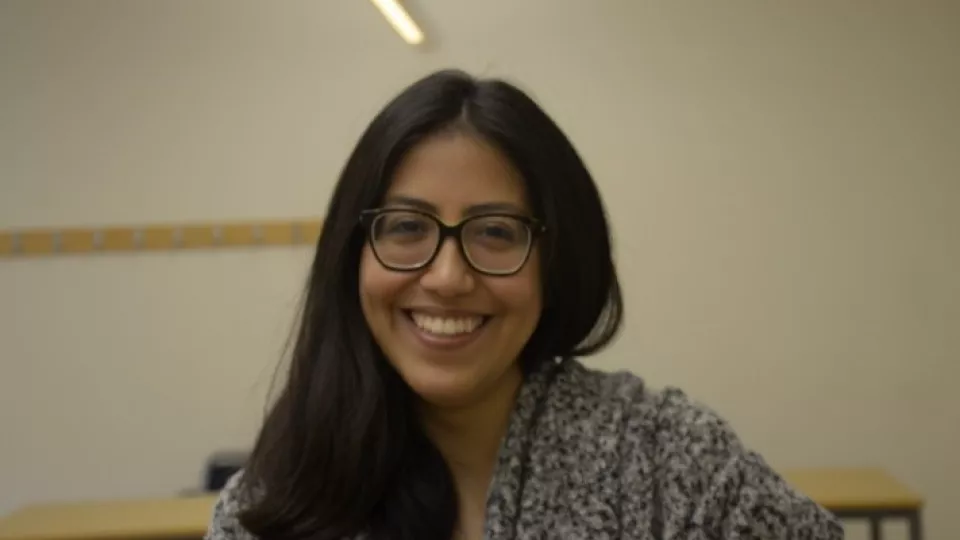What is the best thing about your programme?
What I like the most about the Master in Service Management is the community of professors and colleagues around me, as well as the reading list and the seminars. I was looking forward to discussions around the service industry and how I can lead projects that put human relations as their main priority. The Master goes beyond the idea of selling a product; it highlights the importance of service and thus the crucial part that the human factor plays in the richness of the customer experience. I love that my colleagues are energetic, curious and driven to problematize the concepts of value creation, servicescape, customer and many others.
Why did you choose the specialisation Culture & Creativity Management?
I have worked on cultural projects at my previous jobs and I know that many companies in the entertainment, art and cultural sectors are interested in providing experiences that enrich the artistic landscape of their cities and connect with the people who live in them. Personally, I want to bring efficient, conscientious cultural projects to fruition. I believe that the best way to do it is to foster a deep understanding of people’s expectations and an ability to conceptualize, process feedback and improve what we do in each iteration. I also want to study the way a company works with its employees to deliver them stability, motivation and energy. I want to learn how to create a better environment for all the people involved, so that our efforts to bring culture to society can be aligned with an internal unity.
What do you think of the teaching style within the programme?
I am especially intrigued by it! We had a great first week of introduction where we talked with professors and previous Master students about the deep learning method. It was a good way to highlight how different the teaching style is here compared to other countries. Failure is as much part of the process as success, and you also learn to find motivation and inspiration on that journey. You have to organize yourself and read at your own pace. No one is going to check on you but they are always available for questions and guidance. I think this is one of the most challenging aspects for me, but I am confident that I will learn to study for my own growth and not only for a pass/fail grade!
What do you plan to do after your studies?
My bachelor was centered on literature and I studied graphic design during my studies. I plan to stay in Europe and apply for consultancy groups and work in the entertainment and publishing industry. I would also love to take part in projects that benefit the growth of cultural spaces in the Nordic countries and in Mexico.
What do you do in your spare time?
I am a part-time graphic designer for Penguin Random House and I design content for their social media. I also work as a copy freelancer for companies in Mexico. On my real free time I like to write on my website, do collages, watch old movies from Hollywood’s Golden Era, listen to crime podcasts, practice my Swedish and Danish and visit Denmark to spend some quality time with my boyfriend.
What is it like to live in Sweden and what have you learnt from it so far?
The most important thing to remember is that it is okay to feel inadequate, strange and anxious while studying and trying to live independently in a new country. You might be struggling with budget, language and having to chose only certain options from the many possibilities around you. You might also feel like time is running fast and the experience will soon be gone. But what is the point of feeling this way when Sweden is so beautiful, safe and full of people to talk to? Buy a book in Swedish and try to translate it just for the sake of it, say Tack så mycket at the superstore and the bus and feel proud. Check your budget and decide where you want to go. Apply for your personal number, for Swedish lessons and if you can for a Swedish ID card. See what happens. It is all about thinking “Might as well do it” instead of “But what if”. You are already here and living one of your dreams. Sweden is a country that allows you to be yourself and discover, improve and learn to appreciate yourself.
Do you have any advice for students considering to study at Lund University or Campus Helsingborg?
An international experience is one of the most stimulating adventures you will ever embark into. Studying a master is all about your choices and wants: the decision to pursue a master stems from your own desire to grow your skills so you can enjoy your work and widen your perspective. I am glad that I chose Lund University because they have proven to be a serious institution that has faith in the responsibility and potential of growth of their students. Lund and Helsingborg are cities that look forward to receive their students every year and you will feel that support. Search for their Facebook groups and see the events they prepare for you, and do your own scavenging for things that you want to try. Prepare yourself for a lot of studying on your own but do not be afraid to ask for help from your peers and teachers. Try to enjoy the rainy and dark weather (it is not as cold as in other parts of Sweden) and the windy nights. Investigate about the different masters, your own plans for the future and the Swedish culture and be aware of the cultural shock. Other than that, Lund is always waiting for you!


